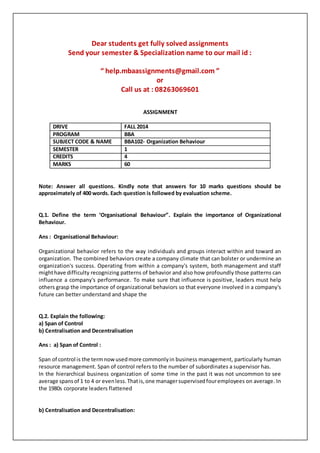
Bba102 organization behaviour
- 1. Dear students get fully solved assignments Send your semester & Specialization name to our mail id : “ help.mbaassignments@gmail.com ” or Call us at : 08263069601 ASSIGNMENT DRIVE FALL 2014 PROGRAM BBA SUBJECT CODE & NAME BBA102- Organization Behaviour SEMESTER 1 CREDITS 4 MARKS 60 Note: Answer all questions. Kindly note that answers for 10 marks questions should be approximately of 400 words. Each question is followed by evaluation scheme. Q.1. Define the term ‘Organisational Behaviour”. Explain the importance of Organizational Behaviour. Ans : Organisational Behaviour: Organizational behavior refers to the way individuals and groups interact within and toward an organization. The combined behaviors create a company climate that can bolster or undermine an organization's success. Operating from within a company's system, both management and staff might have difficulty recognizing patterns of behavior and also how profoundly those patterns can influence a company's performance. To make sure that influence is positive, leaders must help others grasp the importance of organizational behaviors so that everyone involved in a company's future can better understand and shape the Q.2. Explain the following: a) Span of Control b) Centralisation and Decentralisation Ans : a) Span of Control : Span of control is the term now used more commonly in business management, particularly human resource management. Span of control refers to the number of subordinates a supervisor has. In the hierarchical business organization of some time in the past it was not uncommon to see average spans of 1 to 4 or even less. That is, one manager supervised four employees on average. In the 1980s corporate leaders flattened b) Centralisation and Decentralisation:
- 2. Decentralisation: Decentralisation reduces the workload of top executives. It improves job satisfaction and morale of lower level managers by satisfying their needs for independence, participation and status. Decision making is quicker. It facilitates growth and diversification. As 3 Define the term ‘Learning’. Explain any three theories of learning. Answer : Learning theories are conceptual frameworks that describe how information is absorbed, processed, and retained during learning. Cognitive, emotional, and environmental influences, as well as prior experience, all play a part in how understanding, or a world view, is acquired or changed, and knowledge and skills retained. Behaviorists look at learning as an aspect of condi tioning and will advocate a system of rewards and targets in education. Educators who embrace cognitive theory believe that the definition of learning as a change in behavior is too narrow and prefer to study the learner rather than the environment, and in particular the complexities of human Q.4. Define the term motivation. Explain Maslow’s need Hierarchy theory. Ans : Motivation : Motivation in management describes ways in which managers promote productivity in their employees. Learn about this topic, several theories of management, and ways in which this applies to the workplace. Use quiz questions to test your knowledge. Motivation in management is the process through which managers build the desire to be productive and effective in their employees. Maslow’s need Hierarchy theory: Maslow's hierarchy of needs is a theory in 5. What is meant by conflict? Describe the Sources of Conflict? Answer : The effective management of workplace conflict requires an understanding of the nature and sources of conflict in the workplace. Conflict occurs when there is a perception of incompatible interests between workplace participants. This should be distinguished from disputes. Disputes are merely a by-product of conflict. They are the outward articulation of conflict. The first step in uncovering workplace conflict is to consider the typical sources of conflict. There are a variety of sources of workplace conflict including Q.6. Write short notes on the following: a) Organization Culture
- 3. b) Conflict management Ans : a) Organization Culture : Organizational culture is the behavior of humans who are part of an organization and the meanings that the people attach to their actions. Culture includes the organization values, visions, norms, working language, systems, symbols, beliefs and habits. It is also the pattern of such collective behaviors and assumptions that are taught to new b) Conflict management : Ans : Conflict management is the process of limiting the negative aspects of conflict while increasing the positive aspects of conflict. The aim of conflict management is to enhance learning and group outcomes, including effectiveness or performance in organizational setting (Ra him, 2002, p. 208). Properly managed conflict can improve group outcomes . Conflict: While no single definition of conflict exists, most definitions involve the following factors: there are at least two independent groups, the groups perceive some incompatibility between themselves, and the groups interact with each other in some way (Putnam and Poole, 1987). Two example definitions are, Dear students get fully solved assignments Send your semester & Specialization name to our mail id : “ help.mbaassignments@gmail.com ” or Call us at : 08263069601
